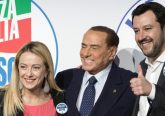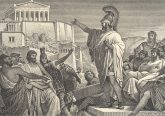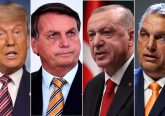Costa Rica, the longest running democracy in Latin America, will hold its 17th consecutive election on February 4th, 2018. According to the latest opinion polls, the leading contender is the controversial populist Juan Diego Castro.
There is a general lack of any candidate receiving overwhelming support, betraying a certain discontent and apathy about the candidates vying for the office of president. From the thirteen candidates in the running, even the five most popular candidates only receive between 5% and 18% of votes; thus, falling far behind the 40% required for a win in the first round. By far, the largest group are those that remain undecided: One in three voters has not made up their minds about which candidate to support next month.
The latest polls show that Juan Diego Castro (18%) from the Partido Integración Nacional (PIN) is in first place of likely voters’ preferences, followed by Antonio Álvarez Desanti (14%) from the Partido Liberación Nacional (PLN), Rodolfo Piza (13%) from Partido Unidad Social Cristiana (PUSC) , Rodolfo Hérnandez (8%) from Partido Republicano Social Cristiano (PRSC) and Carlos Alvarado (5%) from the governing Partido Acción Ciudadana (PAC).
While the lacking popularity of incumbent President Guilermo Solis’ party and the traditionally ruling parties PLN and PUSC are itself noteworthy, the most surprising fact is that the current leader of the pack of Presidential contenders is Juan Diego Castro. Castro has been compared to Donald Trump for his populist rhetoric, the way he has used social media, especially Facebook, which is widely used among Costa Ricans, and also because he has been a constant presence on national television as high-profile lawyer.
The Issues that Face Costa Rica
To understand how a demagogue such as Castro became the leading contender in Costa Rica’s upcoming election, it is important to look at the issues that preoccupied the country in 2017:
Security
Globally admired for having abolished its army in 1949, and considered one of the safest countries in the region, Costa Rica has hit a record homicide rate of 12,1 per 100.000 inhabitants for 2017. This was the highest in the country’s history and has positioned Costa Rica among the 50 countries with the highest homicide rates in the world. Even though authorities have characterized this increase as primarily caused by and limited to gang-related issues, the public perception is that generalized and pervasive insecurity is on the rise.
Corruption Scandal
In 2017, Costa Rica was rocked by one of the small country’s biggest-ever corruption scandals, known as “cementazo”. The scandal has implicated all three branches of government, leading to the early retirement of the Chief Prosecutor Jorge Chavarria, the suspension and investigation of a Supreme Court judge, the investigation of multiple members of parliament from almost all parties and directors of one of the state-owned Banco de Costa Rica. While the investigation remains ongoing and further revelations are likely, the cementazo has overshadowed the Presidential campaign and undermined trust in democratic institutions and elected officials.
Public Transportation
Although 98% of Costa Rica’s electricity comes from renewable sources, with one of the highest per capita rates of car use in the Americas and a lack of efficient public transportation system, Costa Rica´s public transportation infrastructure and fossil fuel consumption is the black cloud over an otherwise stunningly green country. While Costa Rican legislators have recently approved a law to increase the sales of electric cars, exempting them from all taxes, which will eventually help to reduce CO2 pollution and fossil fuel consumption, it will not ameliorate the situation of overcrowded and underfunded public roads that make Costa Rica one of the top 10 worst countries to drive in. Daily traffic jams have increased the discomfort of daily life and led to discontent with current and past governments for not being able to solve this issue.
Social Issues
Home of the Inter-American Court of Human Rights (IACHR), Costa Rica is the only country in the whole American Continent with a recognized official state religion (Roman Catholic), which has manifested its influence over public life on a number of issues, for example in keeping Costa Rica´s ban of In-Vitro Fertilization (IVF) in place until 2016. The push and pull of progressivism versus conservatism has been especially pronounced in regards to LGTBI rights. While the outgoing government has taken some steps in recognizing LGTBI rights, on December 3rd San José saw a massive demonstration of conservatives in defence of the “traditional family.” Evidencing that the church still wields large influence. Consequently, the country finds itself deeply divided on social issues like sexual education, equal marriage, LGBTI rights and abortion.
Costa Rica’s Trumpian Candidate
These issues provide the background for the 2018 election. The discontent they have generated and their contentious nature have made Costa Rica, a country usually known for political moderation and avoidance of political extremes, a fertile ground for a demagogue like Juan Diego Castro, who has managed to stand out from the rest of the candidates by fashioning himself as a brazen and outspoken outsider, even though he was a Minister from 1994-97.
His campaign is based on a discourse of fighting corruption, attacking the other parties for their involvement in the “cementazo,” and his “mano dura” approach to crime. As a candidate, Castro has already shown some of the signs of a tyrant. He has used his social media presence to make personal attacks on reporters and critics. He has called the media liars any time his actions have been questioned, has avoided participating in televised debates and regularly blocked those are opposed to his positions on social media.
As Minister of Security, on December 7th, 1995, Castro lead more than 200 police officers to the gates of parlament to preassure lawmakers to aprove reforms of public security legislation. This was interpreted as an explicit threat and led to the first, and only, no confidence vote from parlament in a member of the executive. When asked about this episode today, Castro dismisses it as fake news and political play by his adversaries to make him look bad.
Castro has already begun to question the legitimacy of the future election, calling Costa Ricans to fight what he already calls to be the biggest electoral fraud. He has also made multiple populist claims, that would be inconstitutional for any president to perform, for example pledging that if any member of congress was involved in corruption, he would personaly take them to jail, showing little for any due process, and ignoring the fact that members of congress have political-immunity that can only be withdrawn by the Supreme Court. Given the currently unfolding corruption scandal, such claims, even if impossible to deliever, are positively received by some voters.
Will 2017’s Discontent lead to the 2018 Election of a Demagogue?
Despite Castro commanding lead in the latest polls, nothing is decided yet. While the other four candidates that are on his heels in the polls have not been able to separate themselves from each other, or from their own parties past failures, all of them are betting on being able to secure the second spot in therun-off election to be held in April. Presenting themselves as the “safer” option, they hope to prevail when push comes to shove. That one of the “establishment” candidates will be able to defeat Juan Diego Castro in the second round still seems the most probable scenario. However, “electability” alone might not be enough to secure the Presidency considering the discontent prevalent in the country.
The rise of Juan Diego Castro, then, should be a clarion call to all candidates in the race. Politicians have to listen to the public and address the issues confronting Costa Ricans. They need to do a better job and have to regain public trust, without falling back on facile demagogy and empty rhetoric. Otherwise, Costa Rica might become another country where an authoritarian-leaning demagogue gets elected.






